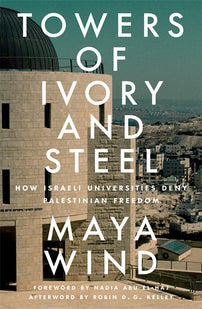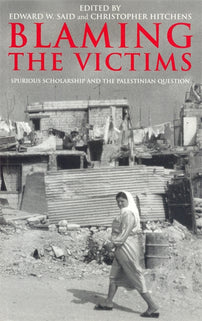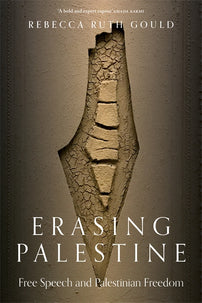Cancellation of Gaza Forum, University of Arkansas – Palestine Uncensored: Testimonial 8
Historian of the Middle East Joel Gordon shares his story of academic censorship after being forced to indefinitely postpone an event with Ted Swedenburg on Palestine/Israel and Israel's war in Gaza.

Joel Gordon, Department of History and King Fahd Center for Middle East Studies
University of Arkanas, Fayetteville, AR USA
Shortly after October 7, I was approached by the Dean of the Honors College with a request to organize a panel for their Pulse discussion series (named in honor of the victims of the attack on the Pulse Nightclub in Miami). They have run a series of such forums in the past on topics such as Ukraine, Taiwan, and abortion.
I invited my former colleague in Anthropology, Ted Swedenburg who, like me, has spent time over many decades visiting Palestine/Israel (including Gaza), in both personal and professional capacity, and who has published extensively on Palestinian history and culture. Because of my own travel plans, we decided to hold the Pulse forum on Wednesday, November 8, after my return to campus.
Preliminary conversations with the Dean of the Honors College covered logistics and preparing a newswire announcement. We were asked to provide a quote explaining, essentially, why this conflict should be of interest to students. I penned the following, which Ted approved of:
“The question of Israeli and Palestinian coexistence remains one of the outstanding unresolved cases of 19th- and 20th-century colonialism, and is too often punctuated by violence,” said Swedenburg and Gordon. “The resurgence of armed conflict in early October underscores the futility of illusions of security in the face of unequal civil and human rights. It is always risky to predict history, but this seems like a turning point. And when passions are ignited, it is always beneficial to ask tough questions rather than fall back on presuppositions and inflammatory rhetoric and to seek answers through dialogue and critical inquiry.”
The PR people in the Honors College penned a newswire, which was amended to change Hamas, as initially described as a ‘militant group’ to a ‘terrorist group’:
Honors College to Host Pulse Discussion Around Israel-Hamas War
The conflict between Israel and the Palestinians has been prevalent for decades, but the surprise violent attack from the militant group Hamas in October, killing more than 1,400 Israelis – mostly civilians, has spurred further brutality. The U.S. State Department designated Hamas a terrorist group in 1997. Following the attack, more than 8,000 Palestinians have been killed while hundreds of thousands have also been displaced in Gaza. Electricity, food and fuel have also been cut off in the Gaza Strip as the situation escalates militarily. In an upcoming Honors College Pulse discussion, Ted Swedenburg, professor of anthropology, and Joel Gordon, professor of history, will discuss the background and potential implications of the latest conflict that has erupted. Both professors have spent extensive time in the Middle East and have written and taught about the conflict in this region and abroad.
Join the conversation from 5 – 6 PM, Wednesday, Nov. 8th in the Honors College Student Lounge.
“The question of Israeli and Palestinian coexistence remains one of the outstanding unresolved cases of 19th- and 20th-century colonialism, and is too often punctuated by violence,” said Swedenburg and Gordon. “The resurgence of armed conflict in early October underscores the futility of illusions of security in the face of unequal civil and human rights. It is always risky to predict history, but this seems like a turning point. And when passions are ignited, it is always beneficial to ask tough questions rather than fall back on presuppositions and inflammatory rhetoric and to seek answers through dialogue and critical inquiry.”
This Honors College Pulse discussion series began in 2016 following the presidential election and was named in remembrance of victims of the Pulse nightclub shootings. Since then, it has featured conversations around the Dakota Access Pipeline Project, the legal ramifications and decisions related to hate crimes, ways to fight local hunger and poverty as well as the war in Ukraine.
This draft is the only copy presently available because the university scrubbed/erased the original announcement when the event was subsequently ‘postponed’. (Note: the announcement is dated November 2, but the event was not formally canceled/postponed until November 8).
All of this was in place by the third week of October. As the date approached, it became clear that the Honors College, as well as higher administration was coming under increasing pressure to either cancel or significantly alter the composition of the panel.
The Honors College received an email from a colleague in the sciences on November 2, claiming there was a ‘mistake’ in the announcement because Hamas had not been designated terrorists (‘People decapitating babies and kidnapping old people in wheelchairs are obviously terrorits. They are in fact not human beings’). And another on the same date, from someone who claimed to have been a former UA student, now engaged in human rights work. His email claimed the announcement was ‘biased and one-sided.’
Simultaneous – and perhaps independently – the Chancellor and University Provost received a letter from a faculty member in Educational Reform, Robert Costrell, characterizing past public statements we had both made in various university forums as ‘demonstrative intolerance of the Zionist viewpoint,’ asserting that open discussion was not permitted, as well as revealing our purported role in ‘cancelling’ a speaker at a conference in 2017 on Honor Killings (his telling is inaccurate, and he was not at all involved). He accused us on inciting anti-Semitism, among other charges (see Appendix 1).
More to the point, he invoked quasi-legal definitions of anti-Semitism, as well as ‘educate, don’t indoctrinate’ legislation, suggesting that the University was treading on illegal ground by promoting, or at least allowing us to speak.
Simultaneous to this, a Youtube upload of a broadcast by Conduit News, an Arakansas alt-right site contained numerous personal charges against us regarding our views on Israel, Palestine and, specifically, Hamas.
The Dean of the Honors College did forward to us all of the 3 emails (2 directed to her and her office, the 1 directed to the Chancellor and Provost), primarily as an indication of the response we were eliciting from certain quarters. When we discussed logistics, the morning before the event was to occur, we did consider issues of controlling certain audience elements and concerns that the event might be taken over by adults, including people from off campus, to the detriment of the students who would be there asking questions and seeking answers.
That meeting took place during the time that we had previously been scheduled to appear on our local Public Radio affiliate – cancelled a day before due to, as we were told, concerns that the event would grow too big.
We did discuss certain ground rules and parameters, and Swedenburg and I planned to meet on campus prior to the event to lay out our own division of speaker duties. We each learned only the next day, about 11:00 am, that the event scheduled for 5:00 pm would not be held.
Various alternatives were discussed, none really satisfactory, including postponing the event until the coming semester and holding it virtually. Thoughts of expanding the panel were broached, but we were under no pressure to bend toward the proclivities of those who attacked the panel – nor would we be willing to do so. Anyone coming from off campus and being compensated would, in any case, be prompted to sign a pledge stating that they do not support BDS – even if they were being compensated under the legal financial threshold $1000 (a separate but very related issue – see the article in the Chronicle for Higher Education from November 1, 2023).
This is an unfolding story. A small group of Middle East Studies faculty subsequently met with the Dean of our College, our immediate supervisor – although we underscored that this was an issue we felt needed to be addressed at higher, wider university levels. We asked, at the very least for a statement from the Chancellor’s office expressing neutrality in the Gaza conflict, regret at the ongoing loss of life, especially of civilian non-combatants, and an expression of concern for academic freedom. We provided numerous examples from fellow institutions and faculties. We also raised the issue of placing the Palestinian flag alongside all the other international flags in a major passageway in the Student Union.
The College did respond with a statement, but we have heard nothing to date from higher up.
We also expressed concerns with the ‘legalization’ of the war on free academic expression – the invocation of legal determinants of anti-Semitism and anti-‘wokeness,’ particularly in the letter to the Chancellor and Provost from Castrell. Student leaders, including from Hillel and the Muslim Student Association, who are outraged at the event’s cancellation, have sought and been granted a meeting with the Chancellor, but not until well after Thanksgiving break. There seems to be no urgency at the top.
At this point, as a faculty, we primarily seek clarification from Higher Administration regarding university compliance with the State of Arkansas ‘anti-BDS law’ and a statement of support for faculty rights to address controversial issues related to the Palestine-Israel conflict within academic forums and venues.
Regarding the former, I told colleagues at MESA that I believed such issues, of state legislated curbs on our ‘speech’ would be the battlefront of the future, long after the immediate violence in Palestine-Israel begins to ebb.
The situation at the University of Arkansas has subsequently been covered in the New York Times. We return from Thanksgiving break tomorrow, November 27, with no resolution to speak of.
Read Testimonial 9 in our Palestine Uncensored series →
[book-strip index="1"]
++++++++
Appendix 1: Letter from Robert Castrell to Chancellor Robinson and Provost Martin, (November 3, 2023)
Dear Chancellor Robinson and Provost Martin,
I was disconcerted, to say the least, to read in yesterday’s UA News release that the Honors College will be hosting a highly imbalanced discussion of the Israel-Hamas War next Wednesday. As I will explain in this letter, there are two compelling reasons that the University should also be highly concerned about this ill-structured panel:
(1) it appears to violate the State of Arkansas’ legal commitment to “Educate, not Indoctrinate,” let alone the University’s professional ethics;
(2) there is reason to believe that the framing of this panel violates the International Holocaust Remembrance Alliance (IHRA) working definition of antisemitism, which was legally adopted by the State of Arkansas (as well as the U.S. Departments of State, Education, and Justice, and the President’s National Strategy to Counter Antisemitism ).
At a time of rising antisemitism on the nation’s campuses the ill-considered structure of this panel seems to recklessly risk inciting those who would bring this alarming phenomenon to Arkansas, a scourge we have been spared to this point. In so doing, the framers of this event may well expose the University to potential sanctions and liability for creating a hostile environment and endangering the safety of Jewish and Israeli students and faculty.
Contrary to UA’s commitment to “Educate, not Indoctrinate,” the only two panelists -- Professor Swedenburg and Professor Gordon, of the King Fahd Center for Middle East Studies -- have long and well-established records as anti-Israel activist-scholars, with demonstrative intolerance of the Zionist viewpoint, to the point of suppressing such views. Their previous panels over the years have been highly biased, similarly devoid of pro-Israel facts and perspectives, and have, indeed, attempted to silence opposing evidence, provided by audience members. In addition, these two panelists have previously exposed the University to very public embarrassment for cancelation of an invited scholar they opposed. Details provided below.
With regard to past UA panels where these two professors not only excluded but actively tried to silence alternative views and evidence, I speak from personal experience, both for myself and for my late wife Rochelle Costrell. In April 2008, my wife attempted to speak from the audience to dispute with factual information a number of calumnies that had been leveled against the state of Israel (“apartheid” state, etc.). The panel’s organizer threatened to call the police. As my wife’s written account of this event added, Professor Swedenborg told her to “get your own event.”
In addition, I can personally testify to a second such instance of these Professors attempting to silence alternative voices to their highly imbalanced forums. I attended such a forum at the time of another Hamas war. The panelists, notably Professor Gordon, whitewashed the genocidal nature of Hamas (which, as always, targeted Israeli civilians with indiscriminate rocket fire). When I rose to read to the audience sections of the Hamas charter which call for genocide against the Jews, Professor Gordon specifically tried to silence me.
In addition, Professors Gordon and Swedenborg have a public record that is well-known of attempting – and succeeding – in canceling the scheduled participation in a 2017 UA Law School forum on “world-wide trends in honor killings” by Phyllis Chesler, one of the world’s experts on the topic. The pressure they exerted upon then-director of the King Fahd Center (Professor Paradise) led to Dr. Chesler’s cancellation, which in turn caused significant embarrassment for the University. Dr. Paradise was suspended, as the scapegoat for bowing to the pressures of Professors Gordon and Swedenborg, as Dr. Chesler explained. (I wrote about this at the time to Chancellor Steinmetz and Provost Coleman.) Clearly these professors have a well-established track record in silencing voices and evidence that run counter to their efforts at indoctrination.
Inciting Antisemitism
We need not rely solely on past performance to appreciate the dangers of this panel. The announcement itself makes it clear that this panel will frame the issue in ways that appear to violate the International Holocaust Remembrance Alliance (IHRA) working definition of antisemitism, which has been adopted by the State of Arkansas. I will elaborate on this below.
The first indication that this panel may violate IHRA is the highly woke fashion in which it is framed, centering around the concept of decolonization. To assert that the conflict is an “unresolved case of 19th and 20th century colonialism,” as Professors Swedenburg and Gordon state, denies Jewish indigeneity to the Land of Israel. It is not only intellectually dishonest to compare the millennia-long presence of Jews in their homeland to the French colonization of Algeria (the subject of Frantz Fanon’s canonical discourse on decolonization); this framing appears to violate the IHRA definition by “denying the Jewish people their right to self-determination.”
The second indication of potential violation of IHRA is the opening paragraph of the UA announcement which clearly traffics in moral equivalence between terrorist atrocities intentionally aimed at civilians and the unintended, but unavoidable civilian casualties in the just war to eliminate the terrorist organization Hamas (so deemed by the U.S. and many other countries, both European and Arab). To cast the casualties of a defensive war against an organization that uses human shields in such terms is to deny Israel the same legitimacy of self-defense that the civilized world used against ISIS and al Qaeda. This violates IHRA by “Applying double standards by requiring of it a behavior not expected or demanded of any other democratic nation.”
At a time of rising antisemitism on the nation’s campuses I believe the citizens of Arkansas are entitled to some accountability of how the responsible authorities organized such an imbalanced panel, recklessly and dishonestly framing the civilizational issues before us.
Sincerely,

Robert M. Costrell
Professor of Education Reform and Economics (by courtesy)
Endowed Chair in Education Accountability
Department of Education Reform
200 Graduate Education Building
University of Arkansas
Fayetteville, AR 72701
https://edre.uark.edu/people/faculty/uid/costrell/name/Robert-Costrell/



